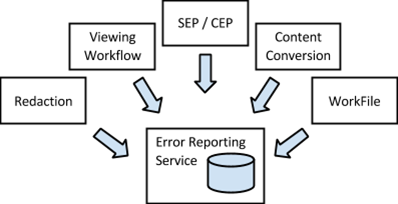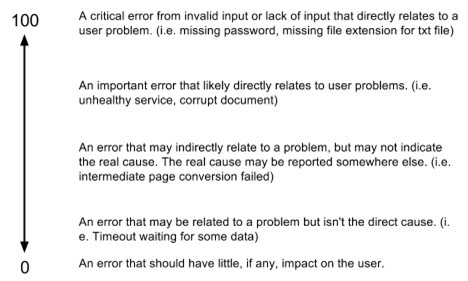Introduction
This section contains the following information:
PrizmDoc Server is composed of a number of micro-services each responsible for some small processing task related to document conversion and viewing. Consequently, an error may occur while processing a small piece of a document and may not be readily apparent to the user.
While it is a simple task for one service to report an error to a calling service, it is not always appropriate to present that error information to the end user. The Error Reporting Service provides a centralized log into which all services report errors with the overall goal of simplifying system troubleshooting:

Error Reporting Configuration
Errors are reported to a log file located in the directory containing the other service log files by default:
- Docker:
PccErrors.log, located in the folder that you mapped as/logswhen creating the container. See Installing / Using Docker for more details. - Windows: C:/Prizm/logs/PccErrors.log
These locations, as well as the number of daily logs to retain, can be found in the central configuration file. The file paths for the Central Configuration file are:
- Docker: <config_folder>/prizm-services-config.yml, where <config_folder> is the folder that you mapped as
/configwhen creating the container. See Installing / Using Docker for more details. - Windows: C:\Prizm\prizm-services-config.yml (assuming the standard install location.)
Error Report Entries
The error log file may contain two type of entries: Errors and Relations. Errors entries describe a specific error event reported by a service and can be used to diagnose issues with a document or service. Relations describe the relationship between two resources and are used to help diagnose an error in which the cause was the result of a failure from another related resource. These are described in further detail below.
Error Entries
An example Error entry is shown below:
Example
{
"gid": "duw97iCztVvreTmqRZdgOw",
"service": "ImagingServices",
"resourceType": "ViewingSession",
"resourceId": "3eHY2FqlgNyHo3i2kx2zJQ38YvNPcQMG4CowwC_71cZ1jRN1l6k48PxBkPkAkGd0xWHXjWmkhdQoRw",
"relevance": 100,
"errorCode": "DocumentRequiresAPassword",
"time": "2015-04-28 20:27:25.0473",
"errorId": "f00hLsu_V8TimZm88w1b6w"
}
| Error Entry | Description |
|---|---|
| gid | This is the Global ID assigned to each new request. It uniquely identifies operations resulting from the original request. |
| service | This is the name of the service which reported the error. |
| resourceType | This describes the resource related to the error. Examples include ContentConverter, WorkFile, MarkupBurner, RedactionCreator. |
| resourceId | This is the unique resource identifier (i.e. ViewingSessionId). |
| relevance | This indicates the importance of the error:  |
| errorCode | This is the error code reported by the service. This will be a PascalCased string briefly describing the error. |
| time | This is the time at which the error was reported. |
| errorId | This is a unique errorId assigned to the error by the Error Reporting Service. |
Relation Entries
An example relation entry is shown below:
Example
{
"gid": "duw97iCztVvreTmqRZdgOw",
"service": "ImagingServices",
"resourceType": "ViewingSession",
"resourceId": "3eHY2FqlgNyHo3i2kx2zJQ38YvNPcQMG4CowwC_71cZ1jRN1DEF0UbuRl6k48P,
"relation": "RedirectedViewingSession",
"relationResourceId": "gRrJ8ay0jV6wBXiqMjxmB4epUrsd7KqVdtsD_BtwAZbhYBVpb4P2ksm0_kcByugmA",
"relationId": "EjA6CpDhFuTMP3sTAvMhyA"
}
| Relation Entry | Description |
|---|---|
| gid | This is the Global ID assigned to each new request. It uniquely identifies operations resulting from the original request. |
| service | This is the name of the service which reported the relation. |
| resourceType | This describes the resource associated with the relation. Examples include ContentConverter, WorkFile, MarkupBurner, RedactionCreator. |
| resourceId | This is the unique resource identifier (i.e. ViewingSessionId). |
| relation | This describes the related resource. (i.e. RedirectedViewingSession). |
| relationResourceId | This is the unique related resource identifier (i.e. ViewingSessionId). |
| relationId | This is a unique relationId assigned to the error by the Error Reporting Service. |
